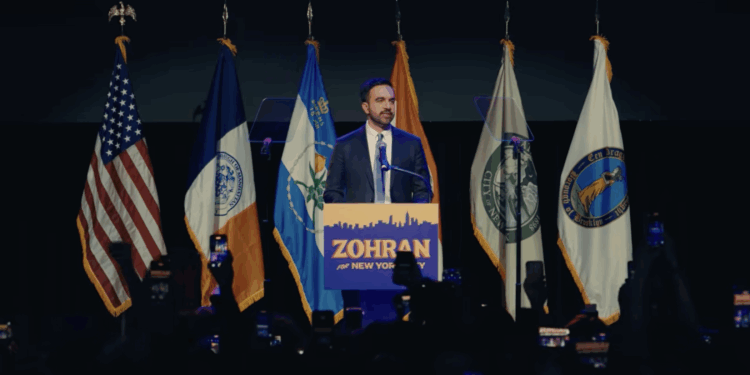For decades, Republicans have banged the “Illegal immigration is bad, but legal immigration is good” drum. As a result, we’ve brought in millions of immigrants that neither care for nor believe in republicanism, self-governance, personal liberty and limited government. And nowhere is that truth more apparent than in Zohran Mamdani’s victory in the New York City mayoral race.
Mamdani, a Ugandan-born communist, doesn’t believe in personal liberty or limited government. He said as much during his victory speech: “We will prove that there is no problem too large for government to solve, and no concern too small for it to care about.”
Similarly, anyone who voted for Mamdani also therefore does not believe in personal liberty or small government.
And what is difficult to ignore is that Mamdani pulled in a lot of support from foreigners.
An October survey from Patriot Polling found Mamdani had 62 percent support from foreign-born New Yorkers, and just 31 percent amongst American-born. Former Gov. Andrew Cuomo and Republican Mayoral candidate Curtis Sliwa had 40 percent and 25 percent support, respectively, among native-born Americans.
Mamdani recently posted a video to X in which he spoke with a voter who said, “I just got my citizenship. And I’m voting for you.”
During Mamdani’s victory speech, he highlighted that the city is made up of the “Yemeni bodega owners and Mexican abuelas. Senegalese taxi drivers and Uzbek nurses. Trinidadian line cooks and Ethiopian aunties.”
But this list of foreigners underscores the problem: these foreigners came from countries that do not share the same values or principles that our republic was founded on. Clearly none of these people value limited government, republicanism, or self-reliance — because their native countries don’t. Rather, they support a system in which the government is the provider.
Ideas of personal liberty and limited government mean nothing to people whose only idea of government come from their native countries were republican values do not flow freely.
Take Mamdani’s native country, Uganda, where the ruling National Resistance Movement “retains power through patronage, intimidation, and politicized prosecutions of opposition leaders,” according to Freedom House. Uganda also punishes gay people with death, while armed assailants are know to attack schools and civilians, according to Freedom House. Uganda also does not have true religious freedom not freedom of the press.
Or take Somalia, where thousands of Minnesota residents hail from. According to CIVICUS “Weak public institutions mean civic freedoms are not enforced as they should be.” Further, Somalia’s “Civil society also struggles with funding, a common problem for civic institutions worldwide, as they rely on domestic and international financial support rather than profits.” The International Center for Not-For-Profit Law reported in October that “civic freedoms are fragile” in Somalia.”
In the third world, government and civil society operate like deeply corrupt patronage networks. But this spoils-system mentality (that often fall along ethno-religious lines and are used to further inter-group conflicts, which they bring with them to America) stands in stark contrast to the American tradition of ordered liberty.
Of course such a reality is incompatible with the United States, where government is intended to be limited while civic responsibility is a heightened priority. Those who grow up under such different regimes are — and have proven to be — unlikely to adopt western ideals of civic and self responsibility. Dependency on the government for assistance, no true understanding or embracing of self-responsibility are apparent.
But Alexander Hamilton cautioned in 1802 how it is “extremely unlikely” that foreigners “will bring with them that temperate love of liberty, so essential to real republicanism” and that foreigners will “entertain opinions on government congenial with those under which they have lived.”
Mamdani’s victory proved that to be true, because no one who is capable of self-governance and believes in individual liberty voted for Mamdani. But it isn’t just Mamdani’s victory that is underscoring how immigrants from Third World countries don’t believe in self-governance and personal responsibility.
The Center for Immigration Studies found in 2023 that 54 percent of “households headed by immigrants — naturalized citizens, legal residents, and illegal immigrants — used one or more major welfare program” compared to 39 percent for native-born households. The rate becomes 59 percent for non-citizen households.
Meanwhile KFF Health News did a report — which was since republished in ABC News — highlighting that the One Big Beautiful Bill passed by Republicans and signed into law by President Donald Trump narrows SNAP eligibility for noncitizens.
One woman, Antoinette, a noncitizen from the Democratic Republic of Congo who can’t speak English and needed a translator, told KFF Health News that without Americans footing the bill, she can’t buy food.
“I would not have the means to buy food,” the woman said through a French translator. “How am I going to manage?”
Antoinette isn’t an outlier. As reported by KFF Health News, the federal government “provides resources such as financial assistance, Medicaid and SNAP” for noncitizens who arrive “often with little or no means.”
Some 90,000 noncitizens are estimated to lose SNAP as the One Big Beautiful Bill is implemented fully.
It’s also worth noting that for much of American history, immigration policy required newcomers to be self-reliant. Under the Immigration Act of 1882, anyone “unable to take care of himself or herself without becoming a public charge” was inadmissible. The idea was simple: citizenship — or even involvement– in our American society required personal responsibility.
And the alliance between immigrants and big government isn’t new.
Note how Franklin Delano Roosevelt (FDR) — perhaps America’s worst president who expanded the government via socialist-style reforms — was bolstered by immigrants. According to University of Virginia’s Miller Center, “recent immigrants” struggled during the Great Depression as they worked in “low-paying industrial jobs that disappeared during the economic crisis.”
“Starting with the 1928 election, the Democratic Party began to win the votes of recent immigrants,” and FDR “built” upon those gains for his New Deal Coalition.
“Most important to the party’s success, however, was the emotional attachment recent immigrants felt toward FDR. They believed that he was their President and saw him as a father-figure who watched after their interests.”
But FDR expanded the government to levels we’ve not been able to undo since. He “expanded the federal government’s power” by introducing Social Security, aid for dependent children, unemployment compensation, regulations on business and trade, and “price stabilization for manufactured and agricultural goods,” according to the Center for the Study of Federalism.
As the Center for the Study of Federalism notes, these programs were used to convince the American people that government is “responsible to promote the economy, provide income support for the elderly, poor, and unemployed…”
In fact, Mamdani during his victory speech echoed this sentiment, saying: “We will prove that there is no problem too large for government to solve, and no concern too small for it to care about.”
When America imports persons from places who have never lived in a republic that depends on self-responsibility and personal liberty, it’s unlikely they will adopt or want those things when they arrive here, as Hamilton pointed out.
Immigration therefore isn’t merely a policy issue, it’s the issue that will decide all others. No matter how great our principles sound, they mean nothing to a population that doesn’t understand or value them. Importing people who don’t believe in republicanism won’t help you keep a republic — and Mamdani’s victory made that crystal clear.
Brianna Lyman is an elections correspondent at The Federalist. Brianna graduated from Fordham University with a degree in International Political Economy. Her work has been featured on Newsmax, Fox News, Fox Business and RealClearPolitics. Follow Brianna on X: @briannalyman2

















